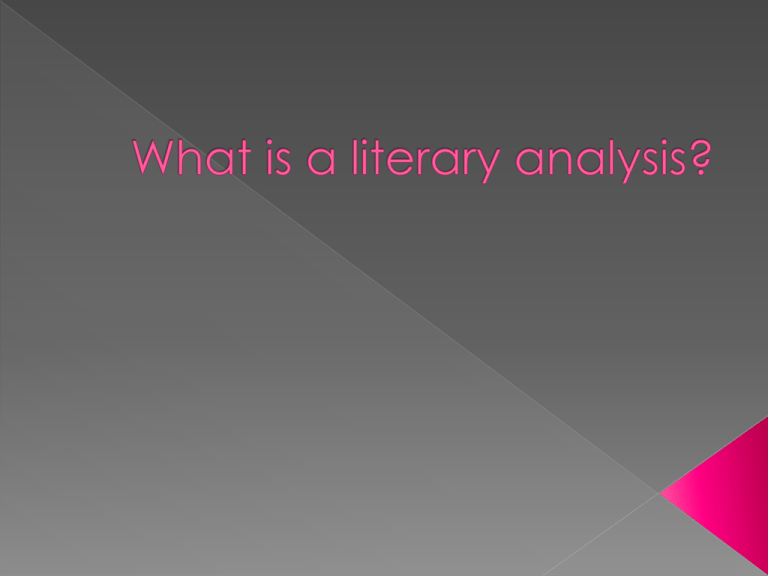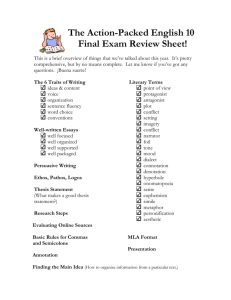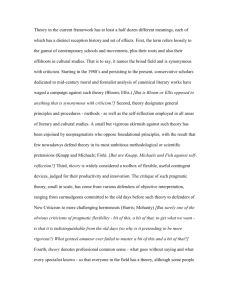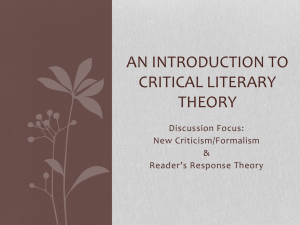What is a literary analysis?
advertisement

How do we study literature? How does viewpoint and bias affect our perception of literature? 1. What – What claim are you making about the text? 2. Why should we care? Why is the claim important? This is the “so what” part. CLAIM + WHY = Literary Thesis 1. Mark Twain’s “Huckleberry Finn” is a great American novel. Is this a good thesis? Where is the WHAT and the WHY? It can discuss how individual components of a novel relate to each other (such as symbols) It may analyze how concepts relate to larger political, social, economic or religious concepts. 1. 2. 3. What is the theme? What is the claim you are making about the theme? Why does it matter? Examples from text Direct quotations Summaries of scenes Paraphrasing Other critics’ opinions Historical or social context You are like a lawyer presenting your case as to why this claim is important. Use evidence to support your reasons. Make sure your points relate back to your thesis statement. This is your guiding light. In “Huckleberry Finn”, Mark Twain develops a contrast between life on the river and life on the shore. In “Huckleberry Finn”, Mark Twain develops a contrast between life on the river and life on the shore. Reader-Response Criticism asserts that a great deal of meaning in a text lies with how the reader responds to it. Focuses on the act of reading and how it affects our perception of meaning in a text (how we feel at the beginning vs. the end) Deals more with the process of creating meaning and experiencing a text as we read. A text is an experience, not an object. The text is a living thing that lives in the reader’s imagination. READER + READING SITUATION + TEXT = MEANING What is the concept? The power of the written word Formalist Criticism emphasizes the form of a literary work to determine its meaning, focusing on literary elements and how they work to create meaning. Examines a text as independent from its time period, social setting, and author’s background. A text is an independent entity. Focuses on close readings of texts and analysis of the effects of literary elements and techniques on the text. Two Major Principles of Formalism 1. A literary text exists independent of any particular reader and, in a sense, has a fixed meaning. 2. The greatest literary texts are “timeless” and “universal.” Psychological Criticism views a text as a revelation of its author’s mind and personality. It is based on the work of Sigmund Freud. Also focuses on the hidden motivations of literary characters Looks at literary characters as a reflection of the writer Sociological criticism argues that social contexts (the social environment) must be considered when analyzing a text. Focuses on the values of a society and how those views are reflected in a text Emphasizes the economic, political, and cultural issues within literary texts Core Belief: Literature is a reflection of its society. Marxist Criticism examines literature to see how it reflects 1. The way in which dominant groups (typically, the majority) exploit the subordinate groups (typically, the minority) 2. The way in which people become alienated from one another through power, money, and politics 4 Basic Principles of Feminist Criticism 1. Western civilization is patriarchal. 2. The concepts of gender are mainly cultural ideas created by patriarchal societies. 3. Patriarchal ideals pervade “literature.” 4. Most “literature” through time has been gender-biased. New Historicist Criticism argues that every literary work is a product of its time and its world. • No one will interpret text STRICTLY from the same standpoint. That is antithetical to what you doing in a literary analysis. • As you read, focus on the text and use these critical approaches to clarify understanding of a text and develop an interpretation of it. It starts with a concept: Growing up stinks In Billy Collin’s poem “On Turning 10”, the poet uses the juxtaposition of childhood and preadoloscenence [WHAT] to illustrate that childhood is an idyllic time in life compared to the bleak reality of growing up. [so what]. 1. Glove essay 2. Letter to Phoebe 3. “The Catcher in demonstrates love the Rye” poem for Allie - - The fact that Holden writes the descriptive essay about Allie’s mitt expresses his fondness for his brother. The description of green ink and hand-written poems are happy memories. - - The letter asking Phoebe to come to the Museum during lunch is a turning point. This is where he shows true maturity and sets out to protect Phoebe from hurt as he says goodbye. - - The poem that is misinterpreted by Holden brings out his need to protect children from cruelty in the world. When asked by Phoebe what he wants to do, he says to save children.






